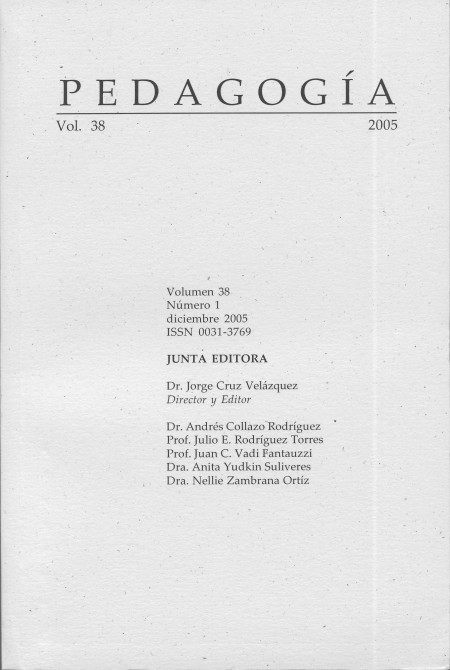Resumen
Cómo citar:
Aybar-Soltero, F. (2005). El deporte organizado como contexto social constructor y reproductor de una masculinidad limitante. Pedagogía, 38(1), 205-217.
Citas
Aybar, F. (1998). Validation of a Spanish version of the physical self-description questionnaire and subsequent comparison of physical self-concept among selected Puerto Rican female high school varsity athletes. Tesis doctoral sin publicar. Philadelphia: Temple University.
Bredemier, B. J. (1994). Children's moral reasoning and their assertive, aggressive, and submissive tendencies in sport and daily life. Journal of Sport and Exercise Psychology, 16, 1, 1.
Berger, P. & Luckmann, T. (1986). La construcción social de la realidad (8va ed.). Buenos Aires: Amorrortu Editores.
Cahn, S. K. (1994). Coming on Strong. Gender and Sexuality in Twentieth Century Women 's Sport. Massachusetts: Harvard University Press.
Cagigal, J. M. (1981). ¡Oh deporte! (Anatomía de un gigante). Valladolid: Miñón.
Cagigal, J. M. (1979). Cultura intelectual y culturafisica. Buenos Aires: Editorial Kapelutz.
Castro, E. & Uriarte, C. (1986). Deporte femenino en Puerto Rico: Historia de discrimen y lucha. Semanario Claridad, 7-13, marzo, pp. 23-27.
Coakley, J. (2003). Sport in Society: Issues and Controversies (8va. ed.). St. Louis: Times Mirror/Mosby College Publications.
Colectivo de Salud Speculum. (1999). Masculinidad y Salud Jerez: V Jornadas de salud y mujer, "Salud, Identidad y Género."
Concepción, F. (1992). La mujer puertorriqueña en el deporte. Tesis doctoral sin publicar. Madrid: Universidad Complutense.
Concepción, F. & Echevarría A. (1997). Tres mujeres deportistas un discurso patriarcal. Pue1io Rico: Franauri Editoras.
Conell, R. (1997). La Organización social de la masculinidad. En: Yaldés, T.; Olavarría, J. (eds.) Masculinidad/es: poder y crisis. Santiago: Isis lnternacional; Ediciones de la Mujer, 24.
Choi, P. (2000). Femininity and the Physically Active Women. London: Routledge Publications.
Desertain, G. S. & Weiss, M. R. (1988). Being female and athletic: A cause for contlict? Sex Roles, 18, 567-582.
Engle, T. L. & Snellgrove, L. (1987). Psicología. Principios y Aplicaciones (5ta ed.). Méjico: Publicaciones Cultural.
Foucault, M. (1986). Vigilar y castigar: nacimiento en la prisión. (5ta ed.). Madrid: Siglo XXI.
Goldberg, A. O. & Chandler T. J. (1991). Sport participation among adolescent girls: Role conflict or multiple roles? Sex Roles, 25, 213-224.
Greendorfer, S. (2001). Gender role stereotypes and early childhood socialization. Women in Sport: issues and controversies. AAHPERD Publications, MD.
Griffin, P. (1998). Strong women, deep closets: Lesbians and homophobia in sport. Illinois: Human Kinetics.
Gruneau, R (1999). Class, sports and social development. Illinois: Human Kinetics.
Gruneau, R. (1999). Modernization or hegemony: Two views of sports and social development. In Not just a game. Ontario: University Ottawa Press.
Gutiérrez, M. (1995). Valores Sociales y Deportes. España: Gymnos Editorial.
Hargreaves, J. (2001) Sporting females: critical issues in the history and sociology of women's sports. (5ta ed.). New York: Routledge Publications.
Holland, A & Andre, T. (1994). Athletic participation and the social status of adolescent males and females Youth and Society, 25, 388-407.
Koivula, N. (1995). Ratings of gender appropriateness of sports participation; effects of gender-based schematic processing. Sex Roles, 33, 543-557.
Koivula, N. (2001). Perceived characteristics of sports categorized as gender-neutral, femenine and masculine. Journal of Sport Behavior, 24, 377-394.
Kornblit, A. L., Pecheny, M., & Vujosevich, J. (1998). Gays y lesbianas: Formación de la identidad y derechos humanos. Buenos Aires: La Colmena.
Lenskyj, H. J. (1999). Women, sport, and sexualities: breaking the silences. En Sport and gender in Canada. Ontario: Oxford University Press.
Lenskyj, H. J. (1998). Sport and corporate environmentalism. International Review for the Sociology of Sport, 33(4): 341-54.
Messner, M. (2002). Taking the field: women, men and sports. University of Minnesota Press.
Messner, M. (1992). Power at play: sports and the problem of masculinity. Boston: Beacon Press.
Messner, M. (1988). Sports and mal e domination. The female athlete as contested ideological terrain. Sociology of Sport Journal,5, 197-211.
Metheny, E. (1965). Connotations of movement in sport and dance. Dubuque: William C. Brow.
Miller, J. L. & Levy, G. D. (1996). Gender role conflict, gender typed characteristics, self concepts and sport socialization in female athletes and non athletes. Sex Roles, 35. 111-122.
Murray, M. & Matheson H. (2001). Psychological and social challenges for females in sports. Women in Sport: issues and controversies. AAHPERD Publications, MD.
Oglesby, C. (1984). Interactions between gender identity and sports. En Psychological Foundations of Sport. Illinois: Human Kinetics.
Ramírez, R. L. (1999). Dime Capitán: Reflexiones sobre la masculinidad. San Juan, Puerto Rico: Ediciones Huracán.
Rees, C. R., & Andres, F. (1980). Strength differences: Real and imagined. Journal of Sport Behavior, 6, 17-27.
Sage, G. H. (1998). Power and ideology in American sport: A critical perspective. Illinois: Human Kinetics.
Schwartz, H. L. (1997). Out of Bounds. Advocate, 729, 56-59.
Thier, J. & Wright, S. (1985). Sport and social status for adolescent males and females. Sociology of Sport Journal, 2 164-171.
Valle T. (1991). Género y sexualidad. Madrid: Fundación Universitaria/Empresa.

Esta obra está bajo una licencia internacional Creative Commons Atribución-NoComercial 4.0.

